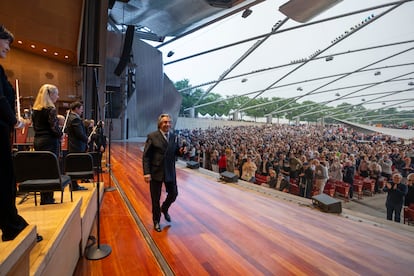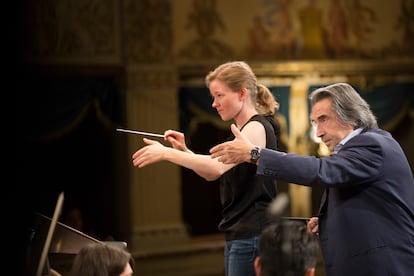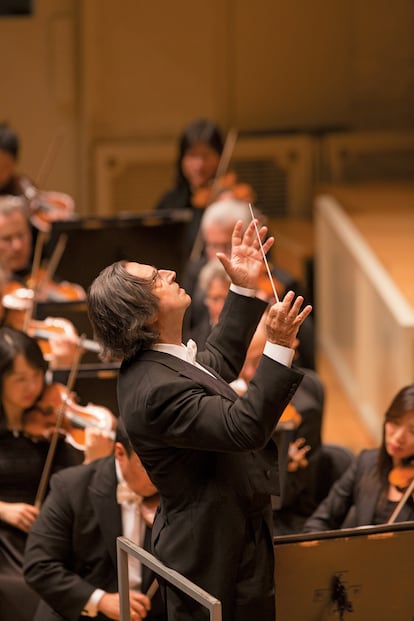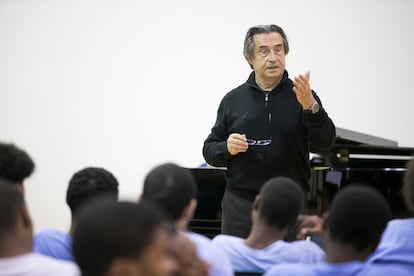Riccardo Muti: ‘I don’t care about what’s politically correct, but about quality’
The legendary Italian director reflects on the past, present, and future of classical music following his farewell concerts as conductor of the Chicago Symphony Orchestra


Riccardo Muti is the proverbial “last of the Mohicans” of orchestral conducting. This remarkable Italian maestro seamlessly succeeded a lineage of Chicago Symphony Orchestra (CSO) conductors that includes eminent figures like George Solti, Daniel Barenboim, Bernard Haitink, and Pierre Boulez. His departure marks the end of a magnificent era in the classical music world. Watching him put together one of his final concerts as CSO director – Beethoven’s Missa solemnis – his talent for shaping the harmonies of nearly two hundred voices and instruments is truly awe-inspiring. One can’t escape the sheer brilliance and transformative power he brings to the music. He achieved this by balancing absolute precision on the podium and a relaxed ambiance during breaks, when he would come down to the stalls, chat, share anecdotes and tell jokes.
These closing concerts in Chicago are the culmination of a 54-year career as the director of an orchestra or opera theater. This extraordinary journey began in 1969 when he became the director at the Maggio Musicale in Florence. He continued with the Philharmonia of London (where he succeeded Otto Klemperer in 1973) and the Philadelphia Orchestra (where he succeeded Eugene Ormandy in 1980). He then served as the musical director of La Scala in Milan for 19 years. In 2010, he became the 10th music director of the Chicago Symphony Orchestra.

In the 13 years since Muti took the helm, the Chicago Symphony Orchestra has brought in new musicians and expanded its repertoire. Muti also established a special relationship with this orchestra, paving the way for a distinguished role as lifelong emeritus conductor that began on June 23. During his tenure, the orchestra not only gained influence in the city and on the global stage, but also overcame significant hurdles during the worldwide pandemic. Among its notable performances are symphonies by Schubert, Schumann, Brahms, and Beethoven, and the premiere of 16 original compositions. Five concert versions of Verdi operas also stand out. During Muti’s tenure, the Chicago Symphony Orchestra released 12 albums on the CSO Resound label and won two Grammy awards.
EL PAÍS interviewed Muti at CSO’s Orchestra Hall in late June during rehearsals for his final concerts. The legendary Italian maestro reflected on the past, present, and future of classical music, and told us what he wants to do now that he will have a little more time.

Question: What are you most proud of during your 13 years as the music director of the Chicago Symphony Orchestra?
Answer. My warm relationship with the musicians in the orchestra. There has not been a single problem or moment of tension between us. And we had the great pleasure of playing an immense repertoire, from Vivaldi and Bach to contemporary American composers.
Q. I understand that you will return in September as the director emeritus to premiere a new composition by Philip Glass, and that you will also embark on an extensive European tour with the orchestra in January.
A. Yes, after debuting Philip Glass’s Eleventh Symphony, which we have just released on the orchestra’s record label, I had a conversation with the composer about Frederick II’s Castel del Monte in Apulia [southern Italy]. It’s a 13th-century castle with magical symbolism associated with the number eight. Glass dedicated a new composition to me titled The Triumph of the Octagon that we will perform on our European tour through France, Austria, Hungary, Italy, and Germany. It will be the opening piece of my upcoming concert at La Scala in Milan.
Q. You seem to have forged a closer relationship between the CSO and Chicago.
A. That’s true. I have always thought it important to bring an orchestra to a city and extend beyond the confines of a concert hall to draw in its citizens. This led me to promote free outdoor performances in the magnificent Millennium Park. I have also been fortunate to have had extraordinary encounters with young inmates of the Illinois Department of Juvenile Justice, and created music for them. I invited some of these young individuals who knew nothing about classical music to our rehearsals. Undoubtedly, there is a great deal of work to be done, not only in Chicago, if we are to preserve this music and actively engage new generations in this ever-changing world.

Q. Have you left your own imprint on the Chicago Symphony Orchestra’s sound?
A. The Chicago Symphony Orchestra has a strong tradition. But when I arrived in 2010, I found a very Germanic orchestra. So I tried to bring in the experience of Mediterranean operatic singing. They enthusiastically joined me in performing several Verdi operas and were delighted to discover the Mediterranean essence in German music, which I have always admired in Wagner’s compositions. I have also supported a generational change by adding about 30 new young musicians to the ensemble, like the excellent Spanish trumpet player Esteban Batallán.
Q. Your name is not usually associated with contemporary music, but one of your early initiatives here was to create the CSO Mead Composers-in-Residence program, which has brought in composers like Anna Clyne, Elizabeth Ogonek, Missy Mazzoli and Jessie Montgomery.
A. That’s true, but I want to stress that I didn’t choose these women based on race or gender. I simply found their compositions more interesting than the men’s. I don’t care about what’s politically correct, but about quality. For me, we are all equal – black, white, yellow, tall or short. Of course, I think it’s wrong to discriminate against African Americans or Latinos. But I believe it’s a mistake to prioritize that over quality. In my latest album, I’ve included a composition by Jessie Montgomery and a wonderful piece by Max Raimi, a violist in the Chicago Symphony Orchestra. I did this to highlight a poignant truth: in today’s musical landscape, the musicians are often better prepared than the conductors.

Q. You also recently conducted Florence Price’s Andante Moderato during her Concert for Chicago. Price was the first female, African-American classical composer.
A. Yes, and on the European tour, I will conduct her Third Symphony. But I didn’t choose it because Florence Price was a woman or because of her skin color. It’s a very beautiful symphony. I also find it culturally interesting to show Europe that there were worthy African-American composers in the early 20th century.
Q. People often say that you belong to a bygone era. What has changed in classical music?
A. In the world of opera, the main change has been the stage directors. I’ve seen some terrible productions lately. While there are exceptions, opera has unfortunately provided an outlet for people to display their incompetence, lack of preparation and even madness. This is also related to the lack of authority among conductors who don’t know enough about vocal technique. All the great voices of the past were coached by conductors. [Maria] Callas didn’t come out of thin air – she was shaped by Tullio Serafin. Nowadays, musical rehearsals have taken a backseat to stage direction. A similar shift can be observed in the symphonic realm. Now we have all these directors in their twenties who dare to conduct Beethoven’s Ninth Symphony or his Missa solemnis, and even Verdi’s Falstaff without understanding a word of Italian – it’s impossible.
Q. Is this why you started the Italian Opera Academy 10 years ago?
A. Yes, and every year I have magnificent students who know nothing about opera from prestigious institutions like the Hochschule für Musik in Berlin, the Royal Academy of Music in London, and the Curtis Institute in Philadelphia. My teacher, Antonino Votto, always said that to be a good opera conductor, you need to breathe in the stage dust. He was referring to all the technical aspects of the stage, in addition to the music. Orchestra conductors today lack authority because they lack knowledge. After a decade of studying piano and composition, I then spent five years with singers in theaters. This experience not only enabled me to earn a living but also deepened my understanding of vocal technique.
Q. Is this why you no longer conduct opera productions?
A. That’s right – I’d had enough after my experience in Salzburg, in 2017. But next year, in Turin [Italy], I will conduct Andrea de Rosa’s production of Verdi’s Un ballo in maschera. And in Palermo [Italy], I’ll conduct my daughter Chiara’s production of Mozart’s Don Giovanni.
Q. Your best-known stage production was a collaboration with Giorgio Strehler, but you also tried partnering with film directors like Ingmar Bergman, Federico Fellini and Bernardo Bertolucci.
A. That’s right. I met Bergman in Stockholm and he struck me as a man with great musical sensibility. I proposed a collaboration, but he said he was retiring after his last film. I suggested doing an opera with Fellini, but he declined because singing didn’t speak to him like the spoken word did. As for Bertolucci, I thought he would be interested in opera after his film La luna, but I was wrong. But all three displayed a humility that doesn’t seem to exist anymore. Nowadays, anyone feels they can take on opera stage direction. I remember when I did Macbeth in Salzburg with Peter Stein (I consider him the “German Strehler”), he was labeled a traditionalist. What does it mean to be a traditionalist? I hope that we will all get tired in 10 or 15 years of not understanding anything, and a new generation will emerge that wants to make real opera again.
Q. Your book, L’infinito tra le note [or Infinity in the Notes], ends by stressing the importance of cultivating classical music now to prepare for its future. How can this be accomplished?
A. It is a topic that preoccupies me in this changing world. There is a quote by Schumann that compares composers to shoemakers because in Mozart’s time, new shoes were all one size – anyone could wear them. That’s why audiences in those days could all sing Là ci darem la mano [a duet from Don Giovanni] as they left a performance. But Schumann said by the mid-19th century, only a few people could wear those new shoes. Today, that connection between contemporary composers and audiences has been almost completely lost. I believe our physiological system remains inherently connected to tonality. Our body, brain, and sensitivity yearn for the presence of a melody, whether it be rooted in the Greek, Egyptian, Amazonian, or Gregorian scale. We possess an innate need to harmonize and reconcile the cacophonies and dissonances that surround us. This extends even to animals, such as cows, who produce more milk when exposed to Mozart as opposed to contemporary music.
Q. Of all your upcoming musical commitments, which one are you looking forward to the most?
A. The invitation from the Vienna Philharmonic to conduct Beethoven’s Ninth Symphony on the bicentennial of its premiere on May 7. It is a great honor to have been asked by the Viennese orchestra. I have had the privilege of collaborating with them continuously since 1971, and have had the pleasure of conducting their renowned New Year’s Concert on six occasions. Throughout our time together, we have developed a deep, mutual understanding of each musical phrase. This connection represents the culmination of over five decades of collaborative work, as we strive to capture the essence of the Viennese musical world.
Q. Now that you’re no longer an orchestra director, what will you do with all that free time?
A. Enjoy life! And to experience seasons like spring and winter, and the rest of the world. I am well acquainted with many hotels and concert halls, but I have seen little of the cities themselves. I would like life to slow down before leaving this world. And I would also like to write one last book. So far, I only have a title – And now, the truth. I’ll write about what happens behind the scenes and what the life of an artist is like. It will be full of very curious – very peculiar and funny things – and some very dramatic ones too.
Sign up for our weekly newsletter to get more English-language news coverage from EL PAÍS USA Edition
Tu suscripción se está usando en otro dispositivo
¿Quieres añadir otro usuario a tu suscripción?
Si continúas leyendo en este dispositivo, no se podrá leer en el otro.
FlechaTu suscripción se está usando en otro dispositivo y solo puedes acceder a EL PAÍS desde un dispositivo a la vez.
Si quieres compartir tu cuenta, cambia tu suscripción a la modalidad Premium, así podrás añadir otro usuario. Cada uno accederá con su propia cuenta de email, lo que os permitirá personalizar vuestra experiencia en EL PAÍS.
¿Tienes una suscripción de empresa? Accede aquí para contratar más cuentas.
En el caso de no saber quién está usando tu cuenta, te recomendamos cambiar tu contraseña aquí.
Si decides continuar compartiendo tu cuenta, este mensaje se mostrará en tu dispositivo y en el de la otra persona que está usando tu cuenta de forma indefinida, afectando a tu experiencia de lectura. Puedes consultar aquí los términos y condiciones de la suscripción digital.








































